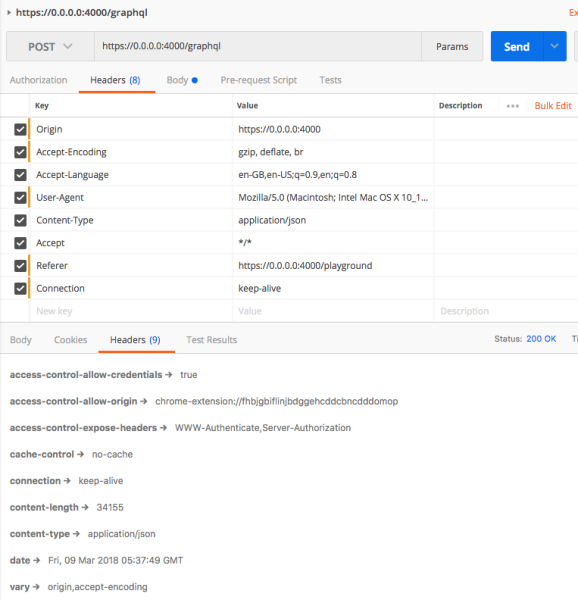According to the this article, it’s encouraged that any production GraphQL services enable GZIP and encourage their clients to send the header: Accept-Encoding: gzip
I’ve tested this in Postman, with “Accept-Encoding” enabled or disable, I didn’t see any difference in the responded “content-length”.
So my question, how to enable GZIP encoding at graphQL server?
0
2 Answers
Enabling GZIP encoding for your GraphQL server is not a feature provided by GraphQL itself. GraphQL is primarily responsible for processing and handling your queries, but it doesn’t directly manage the compression or Content-Encoding of the HTTP responses.
To enable GZIP compression for your GraphQL server, you would typically configure the underlying HTTP server that hosts your GraphQL service. If you’re using a Node js-based server, you can use libraries like zlib to compress your server’s HTTP responses. Alternatively, you can use existing tools and libraries like the "compression" middleware for Express, which makes it easier to enable GZIP compression for your GraphQL server.
Q: How to enable GZIP encoding at graphQL server?
A: Short answer, you can’t.
Why? Because GraphQL is just a library for parsing your graph queries and calling the appropriate functions, supplied by you, to build out a graph response.
It is not about compressing your HTTP response and making sure that the response has the Content-Type=Gzip header in it.
In other words, what that piece of document is trying to say is that the GraphQL response looks pretty much like JSON and therefore they work well when compressed. Mainly because raw graph responses can be quite bloated in size and it is inefficient and slow to transfer them across the network.
Just in case your HTTP server for graphql is implemented in NodeJS, you can use the zlib to do the compression. See documentation.
If you are the majority of people who uses theexpress framework for NodeJs then it is even more easier as there is a compression plugin for it already. See here.
1
-
20
I think this response is very confusingly worded for what the OP is asking. I understand you're delineating between the HTTP server which is actually receiving requests and serving responses, and the GraphQL framework which delegates requests in the code. But, it is clear from the OP has an HTTP server running locally, which uses a GraphQL framework. Just because the wording in the OP was slightly off doesn't mean you should lead with "You can't". Would be much more helpful to the OP and future readers to lead with compression libs, then explain the diff between GQL and HTTP
– Eric DauenhauerMar 24, 2021 at 20:00



